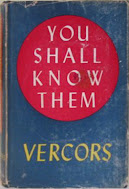But the premise is oddly prescient: a group of primates is found, and plans are made to have them serve as unpaid workers. A do-gooder artificially inseminates a female, has the offspring's birth registered, and murders him. He then confesses to murder, charged in Britain with infanticide. The primates ultimately are declared human, of course - at least, that's what I remember. (Much of this comes not from my rusty memory, but from an excellent synopsis at https://anthropology365.com/2018/01/01/book-review-you-shall-know-them/)
This book didn't create an earthquake in my life (as did Catch-22, Black Elk Speaks and a few others), but it did shape my thinking.
My mother impressed on me a reverence for all life. It was part of her Christianity, of her education by a mother raised as much as an animist as a Christian, of her own appreciation of the beauty of the natural world. (She wasn't crazy; she still cut the heads off grasshoppers in her garden.)
So when I read this book it was an echo of what I had been raised to believe. The natural world isn't here for us to use; it's here for us to collaborate with, to protect and to (yes) be fed by, as we in turn feed it. (Here's a thought: every mouthful you eat is composed of molecules of the rot of plants, animals and people who died long ago.)
Our dedication to extractive technologies, to capitalism at any cost, to exploitation of every damn thing on the planet will not end well - for us, or for the planet.
So walk gently on the Earth, my friends. Plant trees, conserve water, watch out for other species' welfare, and forego buying The Latest Thing. And remember to appreciate all the we have in this beautiful world, even those things for which we have no use.
Tangent:
When I was a kid, I saw this on a pack of Pall Mall cigarettes: "Ad astra per aspera" and "In hoc signo vinces." I already knew the first quote, in the banner around the shield (reach for the stars), because I had read the foreign words and phrases section of our old dictionary. The second one, in the banner across the bottom, I asked about and Mom said it meant "In this sign we conquer."
Those are the weirdest mottoes for a tobacco company ever.
This all came to mind because the name of the book, above, is a partial quote: "By these fruits you shall know them," a quote from the Gospel of Matthew.







